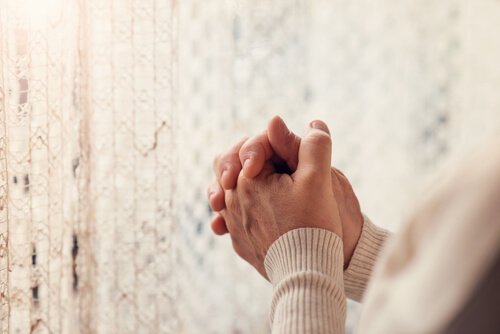Spirituality Helps Manage Stress

In the last few years, different studies have shown that spirituality helps manage stress. Even though many people associate spirituality with religion, one can live spiritually without having any religious beliefs. You can even live both spiritually and religiously.
In this sense, religion is a set of beliefs and practices that a group shares regarding a relationship with a higher power. On the other hand, spirituality refers to an individual’s relationship with a spirit. Most commonly, this spirit can be a higher power (like a god). Or it could simply be a representation of the connection between human beings and a greater metaphysical reality.
That’s why people can be religious without being spiritual and spiritual without being religious. Some people practice spirituality regardless of their religion.
Some studies have shown that spirituality helps protect against depression as it thickens the cerebral cortex. A 2014 Columbia University study found that parts of the cerebral cortex thickened with regular meditation and other spiritual or religious practices. This explains why these activities may help protect against depression.

Practicing spirituality helps manage stress
Spiritual people have different ways of expressing that spirituality. For example, they can pray, go to religious services, interact with people who share their beliefs, meditate, or even contemplate nature, music, or art.
For instance, religious people tend to think of prayer as a way to connect with their god. Praying helps them feel calmer, more secure, and more grounded. This can help reduce stress. On the other hand, meditation has similar benefits. For example, it helps reduce blood pressure and boost immunity. In addition, it can also help manage stress.
Prayer and meditation can bring inner peace.
Spiritual people are usually grateful and express that gratitude. Being grateful helps reduce stress.
Spirituality helps manage stress
Spirituality helps manage stress in various ways. It generates a sensation of peace. Additionally, it also helps us reestablish communication with our mental and physical states.
We spend a lot of time working and going from one activity to the next. Sometimes, we even do various activities at once. We also spend a lot of our time listening to others and trying to distract ourselves although our mind is filled with different thoughts.
Practicing spirituality can help us find moments to breathe in the chaos of everyday life. The time we spend meditating, praying, or even appreciating whatever is going on around us helps us understand our reality.

Spirituality also helps manage uncertainty. Trying to control everything is a great source of frustration because it’s impossible. Therefore, freeing yourself from this can help you feel less anxious.
On the other hand, spirituality significantly improves how we experience positive or negative events. We begin to learn from our situations instead of superficially experiencing them or victimizing or blaming ourselves.
There’s no doubt that spirituality also improves our sense of connection. Feeling like a part of something greater than ourselves can make us feel less lonely and isolated. Most stressful situations will seem smaller and easier to handle if we know we belong somewhere.
Spirituality also helps us have a sense of purpose
The improved sense of connection and sense of meaning derived from spiritual practices allow us to look beyond ourselves. What’s more, this increases our sense of responsibility to our community and to the universe itself.
In essence, spirituality helps manage stress thanks to the change of perspective it generates. Spiritual practices can help us transform obstacles that seem insurmountable into more feasible challenges. Spirituality also helps us focus on what’s really important in our lives.
In the last few years, different studies have shown that spirituality helps manage stress. Even though many people associate spirituality with religion, one can live spiritually without having any religious beliefs. You can even live both spiritually and religiously.
In this sense, religion is a set of beliefs and practices that a group shares regarding a relationship with a higher power. On the other hand, spirituality refers to an individual’s relationship with a spirit. Most commonly, this spirit can be a higher power (like a god). Or it could simply be a representation of the connection between human beings and a greater metaphysical reality.
That’s why people can be religious without being spiritual and spiritual without being religious. Some people practice spirituality regardless of their religion.
Some studies have shown that spirituality helps protect against depression as it thickens the cerebral cortex. A 2014 Columbia University study found that parts of the cerebral cortex thickened with regular meditation and other spiritual or religious practices. This explains why these activities may help protect against depression.

Practicing spirituality helps manage stress
Spiritual people have different ways of expressing that spirituality. For example, they can pray, go to religious services, interact with people who share their beliefs, meditate, or even contemplate nature, music, or art.
For instance, religious people tend to think of prayer as a way to connect with their god. Praying helps them feel calmer, more secure, and more grounded. This can help reduce stress. On the other hand, meditation has similar benefits. For example, it helps reduce blood pressure and boost immunity. In addition, it can also help manage stress.
Prayer and meditation can bring inner peace.
Spiritual people are usually grateful and express that gratitude. Being grateful helps reduce stress.
Spirituality helps manage stress
Spirituality helps manage stress in various ways. It generates a sensation of peace. Additionally, it also helps us reestablish communication with our mental and physical states.
We spend a lot of time working and going from one activity to the next. Sometimes, we even do various activities at once. We also spend a lot of our time listening to others and trying to distract ourselves although our mind is filled with different thoughts.
Practicing spirituality can help us find moments to breathe in the chaos of everyday life. The time we spend meditating, praying, or even appreciating whatever is going on around us helps us understand our reality.

Spirituality also helps manage uncertainty. Trying to control everything is a great source of frustration because it’s impossible. Therefore, freeing yourself from this can help you feel less anxious.
On the other hand, spirituality significantly improves how we experience positive or negative events. We begin to learn from our situations instead of superficially experiencing them or victimizing or blaming ourselves.
There’s no doubt that spirituality also improves our sense of connection. Feeling like a part of something greater than ourselves can make us feel less lonely and isolated. Most stressful situations will seem smaller and easier to handle if we know we belong somewhere.
Spirituality also helps us have a sense of purpose
The improved sense of connection and sense of meaning derived from spiritual practices allow us to look beyond ourselves. What’s more, this increases our sense of responsibility to our community and to the universe itself.
In essence, spirituality helps manage stress thanks to the change of perspective it generates. Spiritual practices can help us transform obstacles that seem insurmountable into more feasible challenges. Spirituality also helps us focus on what’s really important in our lives.
All cited sources were thoroughly reviewed by our team to ensure their quality, reliability, currency, and validity. The bibliography of this article was considered reliable and of academic or scientific accuracy.
- Commons, M., Staddon, J., y Grossberg, S. (1991). Neural network models of conditioning and action. Hillsdale: Lawrence Erlbaum Associates.
- Miller, L., Bansal, R., Wickramaratne, P., Hao, X., Tenke, C., Weissman, M., y Peterson, B. (2014). Neuroanatomical Correlates of Religiosity and Spirituality. JAMA Psychiatry, 71(2), 128. doi: 10.1001/jamapsychiatry.2013.3067
- Paull, C. (2006). 101 ways to relax and reduce stress. Franklin, Tenn.: Dalmatian Press.
- Tuck, I., Alleyne, R., y Thinganjana, W. (2006). Spirituality and Stress Management in Healthy Adults. Journal Of Holistic Nursing, 24(4), 245-253. doi: 10.1177/0898010106289842
- Weiss, B., y Morera, V. (2013). Meditación. Barcelona: Ediciones B.
This text is provided for informational purposes only and does not replace consultation with a professional. If in doubt, consult your specialist.







